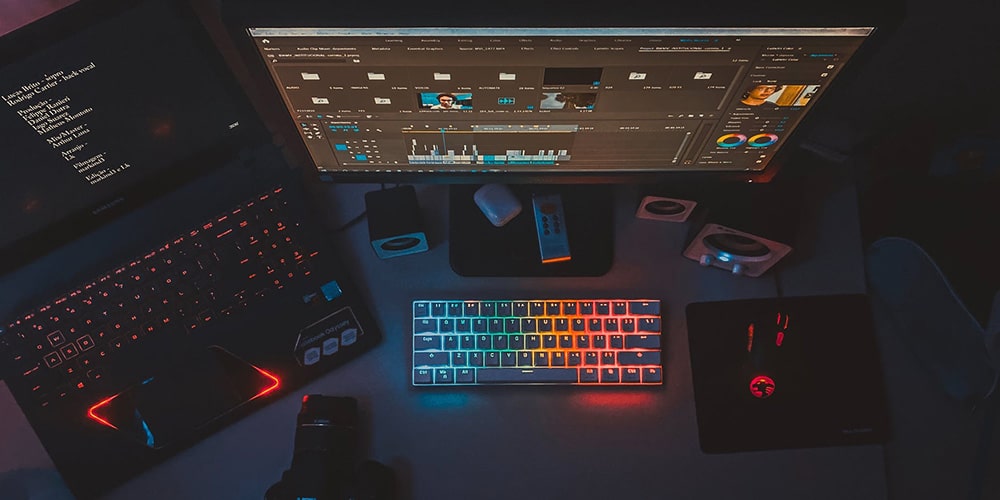
The World of VFX and Compositing
Table of Contents
We will talk about a key piece in any production, Compositing, and VFX for special effects.
It surrounds us, it is in front of us, we look directly at it and we are not yet able to say if it’s real or not. VFX is a procedure of creating imaginary Effects using live-action footage which are captured using Cameras. It can be a mixture of real and animated images, for example shots form TRANSFORMERS, AVENGERS, etc. Compositing is the final step of the VFX pipeline. A professional compositor layers together various elements in his way to make it appear natural in the same space. Compositing and VFX for special effects account for 99% of all productions in film, television or advertising Industry.
Let’s explore the power of visual effects that change reality, deceive and create scenarios and worlds that seem perfectly real and feasible.

VFX
Normally it is being managed by a small group of TDs (Technical Directors) very specialized in this discipline. The VFX is quite expensive, not only in managing the resources of a company but also on a personal level. You just have to see the budgets, for example, ‘The Avengers‘ has had a budget of 220 million dollars and “Avatar” even higher, 237 million.
VFX operators are highly qualified and scarce in the Audio-Visual Industry, this is because the software used form Autodesk, Foundry or Adobe is very complex and also usually requires knowledge of trigonometry and basic vector algebra.
VFX operators dedicate several weeks to create a single VFX plane. In fact, it is common for several operators to work simultaneously on the same effect. A VFX operator requires a lot of talent, intelligence and practice. Even the simplest VFX on screen may have taken a lot of development time in production.
One of the characteristics of VFX professionals is that they have technical profiles that normally require an artistic direction behind. It is very easy to get lost in creating a functional effect or solving a complicated plane so that the complete operator who possesses the technical and artistic capacity will be invaluable.
Due to the difficulty associated with this profile, many operators who seem to exhibit their capabilities while executing an effect, could lack the necessary artistic vision to be able to create a magnificent final result. It is a highly valued position in the industry today and it is unusual to find FX TDs that are not active.
Compositing, what is it about?
Compositing serves to make up reality in an audiovisual production chain. All the effort, the material generated and the final result fall into the hands of the Compo department, were using software such as The Foundry Nuke, a final finish is given and all the pieces of the puzzle are put together.
All raw materials such as recorded or photographed elements from different places (shooting sets, landscapes, 3D images, etc.) must be integrated into a single image, which must seem real to the final viewer. This gives a strong punch to the quality of the product.
On the contrary, if the compositing part did not exist, the final product would lose strength and would not look like a solid and unique piece. It would lose intentionality, nuances and the final piece could end up with a mediocre finish. That is the power of Compositing in VFX for special effects.
Many different sources supply material to compositing, for example, matte painting backgrounds, motion graphics elements, lighting, and VFX passes, real shooting, photographs, art references, color studies. There are many elements, formats and departments involved in serving all this material.
The Compositing department is not only concerned with mixing all this material, but it is also responsible for correcting render failures, helping the FX department in some planes, providing advice on lighting and rendering layers or how to illuminate a certain element to finish completing it, and so on. It is a department of “surgeons”, rather small, within the CGI animation studios. It requires specialized, effective and functional profiles in which all responsibility and the final weight of the production rests. They can take all the material to a higher level, which not only requires technical knowledge on how to solve the plans or fix inherited problems but a great taste and artistic knowledge, which is really what is behind everything. That is the strength, versatility and what makes a few people able to turn around an average product into a masterpiece.
As we can see, Compositing and VFX for special effects are two very different departments that complement each other perfectly. Both are key pieces in any film or animation studio and are also the two of the most “senior” disciplines we can find.
An operator who can solve the technical problems of effects on a plane and possess the artistic ability to compose them becomes a ‘white blackbird’ of the industry. A profile with many possibilities, that has the option to specialize later in one discipline or another. Someone with this knowledge, together or separately, becomes someone of great value for companies who are dealing with effects.
Most importantly, our potential is defined by ourselves. Our dedication and perseverance will take us as far as we wish to go. So, if you see yourself in this career then your first step will be knowing what you should study to become an expert in VFX & Compositing. There are many VFX courses and even diplomas offered by many colleges in Bangalore. One of them is Animaster College of Animation & Design. They have designed career and short term programs to help students opt with the ever-competitive environment of students.
For more details, visit our website: www.animaster.com



